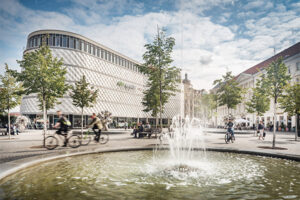The importance of retail parks will increase in suburban locations of large cities, in medium-sized and especially in small towns, forecasts the market research by GfK. One consequence of the pandemic will become more permanent: The supply of important everyday products will increasingly take place close to home as a result of the growing fusion of living and working.
Meanwhile, fewer and fewer people are commuting to (large) cities. As a result, urban districts and surrounding areas are gaining in importance. Rural areas can also benefit from this. One example: 700,000 residents turned their backs on London during the pandemic.
Sustainable Shopping and location positioning
“Outside of high-density urban neighborhoods, traveling by car remains indispensable for local supply,” says Maria Grubmüller (Senior Associate Real Estate at Nuveen Real Estate). Therefore, locations with generous parking space are preferred there, which should be located not far from the city limits and, for example, enable shopping on the way to and from work. “Consumers will appreciate sustainable one-stop shopping even more in the future,” says Grubmüller.
Specialized retail locations with a strong local supply character are significantly stronger, more crisis-resistant and better positioned on the market than they were just a few years ago. Nevertheless, owners and operators must focus their strategies not only on the real estate, but increasingly on the specific needs of the local location, predicts Christian Schröder (COO of MEC): “Today, traditional retail functions are increasingly being expanded to include social functions and create important meeting places for people. Retail locations are an ideal platform for this.”
Transformation, politics, and climate
Jörg Krechky (Head of Retail Investment Germany at Savills Germany) supports this statement: “Retail parks are in demand among investors. Just under a quarter of the total transaction volume in retail real estate in Germany was recently attributable to retail parks.” To ensure that this remains the case, they must be open to change.
Effective cooperation between all players is crucial to the success of the transformation. In addition to real estate investors and operators of retail parks, this team includes above all politicians and public administrators, Uwe Seidel (Managing Director of the management consultancy Dr. Lademann und Partner) is certain: “Only a significant streamlining of regulations and laws in German construction planning law, as well as an acceleration program for public procedures will help to convert retail parks and make them future-proof.”
Future-proof retail parks: one prerequisite is operating properties in a climate-neutral manner. And it’s not just the environment that benefits. “In retail parks with a holistic concept for climate neutrality, the attractiveness of the existing buildings can be maintained, and their value increased. Because: sustainability is the new currency on the real estate and financial market,” looks Joaquin Jimenez Zabala (Head of Sales & Strategy Retail Real Estate at the facility service provider WISAG).
The Retail Park Report 2021 “About Tomorrow–Retail parks in the city of the future” can be viewed and downloaded here (disclaimer: only available in German).





